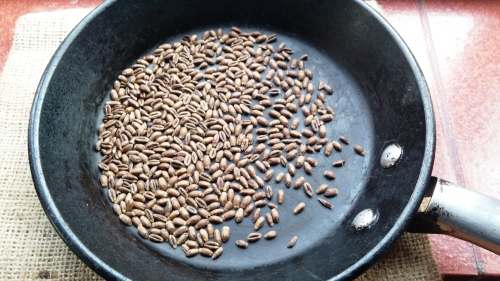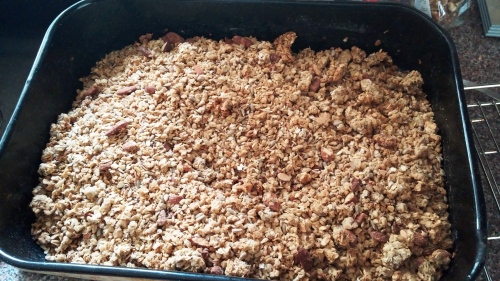Today, I’m thanking Fornax for the batch of granola I’ve just baked.
Although calendars have changed a tad over the millennia, February 17 is apparently – more or less – Fornacalia, the feast day of Fornax. Fornax was one of ancient Rome’s divinities, specifically a goddess associated with the oven.
Although I’m not religious, neither as a follower of living religions or (presumably) defunct ancient Roman practises, I’m interested in religious and mythological stories. And as my oven works so hard for me, it seems only right to at least stop and acknowledge Fornax and Fornacalia. Never mind the act of stopping to acknowledge how fortunate I am to have a working oven, ready fuel and enough food.
The name Fornax is connected with the modern English word “furnace” as well as the modern Italian word forno, which you’ll often see on bakeries*. Fornax was both the name of the oven, kiln or furnace and the name of the personification of these pieces of equipment that were, and are, so fundamentally important for baking bread, cooking, heating, metal working and pottery.
An oven specifically for making bread was called a clibanus. The modern English word focus, meanwhile, is actually the Latin for hearth, fireplace. The picture above is of ancient Roman bakery, with the oven on the left and lava grindstones on the right. It’s the bakery of Modestus in Pompeii, and when it was unearthed, the oven had iron doors in place still with the remains of 81 carbonised loaves of bread behind.
Apparently ancient Romans draped their ovens with garlands and made an offering of spelt, which was itself carbonised in the oven. The former doesn’t seem entirely safe with a modern (-ish) electric and gas affair, but burning I’ve burned a handful of spelt (a suitably ancient form of wheat) while the oven is still hot from the granola. Thanks for all the baked goods Fornax!
Ovid, Fasti
This is from book 2 (February) of Ovid’s six book poem published in 8AD:
“The earth of old was tilled by men unlearned:
war’s hardships wearied their active frames. More
glory was to be won by the sword than by the curved
plough; the neglected farm yielded its master but
a small return. Yet spelt the ancients sowed, and
spelt they reaped; of the cut spelt they offered the
first-fruits to Ceres. Taught by experience they
toasted the spelt on the fire, and many losses they
incurred through their own fault. For at one time
they would sweep up black ashes instead of spelt,
and at another time the fire caught the huts them-
selves. So they made the oven into a goddess of
that name (Fornax) ; delighted with her, the farmers
prayed that she would temper the heat to the corn
committed to her charge. At the present day the
Prime Warden (Curio Maximus) proclaims in a set
form of words the time for holding the Feast of Ovens
(Fornacalia)…”
* There’s some suggestion, like here, that fornax was also related to the word “fornication”. But “Fornacalia” seems to be commonly misspelled “Fornicalia” – by, among others, that blog, and me. But etymolgy of the word “fornication” is in the Latin root fornix, meaning arches, vaults, basements, and brothels situated in such places, not the word fornax. Though they may be related, as fornus is Latin for “oven of arched or domed shape.” I can’t find any info about the roof “forn-“.
Of course, baking, sex, fertility and pregnancy have long been connected, with fertility goddesses often having purview over both crops and human reproduction. And you could say that the proving and expansion of a beautiful ball of real bread dough makes a suitable figurative comparison with the swelling of a pregnant human belly, I’ve yet to find a satisfactory explanation of the origin of the phrase “to have a bun in the oven”. Various suggestions are knocking about online if you care to google.




Thanks for the history lesson. Did you ever visit the Baker’s Monument in Rome?
Went past it a fair amount on the tram and train!
Pingback: Fornacalia revisited – Fornacalia